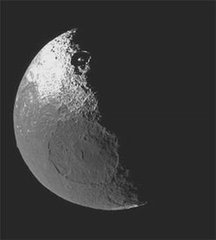(单词翻译:单击)
The universe is full of weird and exciting things, a lot of which we still don't really understand,
宇宙中充满了奇怪而令人兴奋的事物,不过有很多我们仍然无法真正理解,
from giant electrical currents in distant galaxies to stars that look like they're surrounded by some kind of alien megastructure.
从遥远星系的巨大电流到看起来像是被陌生巨型结构包围的恒星,皆是如此。
But even just within our own solar system, there are plenty of strange hunks of rock.
即使在我们自己的太阳系里,也有很多奇怪的大块岩石。
Because the solar system has some ugly, pockmarked, and sometimes very potato-like moons.
因为太阳系有一些丑陋的、坑坑洼洼的、有时很像土豆的卫星。
First up: Miranda, Uranus's largest moon.
第一个就是天卫五,它是天王星最大的卫星。
Miranda has some very distinct features that have left astronomers wondering why it's so ugly.
天卫五有一些非常独特的特征,让天文学家们想知道为什么它如此丑陋。
In addition to the usual craters and pockmarks that cover any rocky object with basically no atmosphere,
天卫五上除了任何岩质物体都有的普通坑洞之外,几乎没有大气,
Miranda has deep, almost parallel gashes running along its southern hemisphere.
在其南半球,分布着几乎平行的深沟槽。
It kind of looks like a ball of yarn, or like a giant space monster was playing basketball and fumbled the ball.
它看起来像线球,或像一个巨型太空怪物胡乱打球留下的痕迹。
What's especially weird about these deep grooves is that they are confined to three regions called coronae, which is just Latin for "crown".
特别奇怪的是,这些深沟槽被限制在三个叫做“coronae”的区域内,它在拉丁文中的意思是“王冠”。
Astronomers do have some ideas about where these features come from.
天文学家们对这些特征的来源有些猜想。
One possibility is that Miranda was hit by something so large that it actually broke the moon apart,
一种可能性是天卫五被某个巨物撞击,并导致其分开,
and the patterns formed as the pieces clumped back together.
当这些碎片重组后形成这种图案。
Don't you love if astronomers aren't sure how a thing formed, they'll often suggest that it got hit by something else.
如果天文学家们不确定某物是怎么形成的,他们通常会说它是由其他物体撞击形成的。你不喜欢这种说法吗?
More recently, researchers have suggested that the ridges and grooves are actually Uranus's fault.
最近,研究人员指出,脊和沟槽实际上是天王星的错。
As Uranus and Miranda orbit, they pull on each other, deforming each other just a little bit.
由于天王星和天卫五的轨道相互吸引,导致两者都有些变形。
And that deformation would generate some heat inside Miranda,
这种变形会导致天卫五内部产生一些热量,
maybe enough heat to lead to geological activity, like icy volcanoes or stretching, which could have formed those ridges.
当热量足够多时,会发生冰火山爆发或地面挤压延伸等地质活动,形成这些脊。
There are still some unresolved questions, though.
不过,仍有一些未解之谜。
Like, why do the ridges only show up in the southern hemisphere? And why only in the coronae?
比如,为什么脊只出现在南半球?为什么它们仅在冕状物区域内?
We might have to wait until the next mission to Uranus to find out.
我们可能要等到下次天王星任务时才能找出答案了。

Then there's Iapetus, one of Saturn's dozens of moons.
接下来就是土卫八了,它是土星众多卫星中的一个。
Iapetus looks like a half-moon cookie, but not because it's hidden in shadow,
土卫八像半月型的饼干,但不是因为它被阴影遮住了,
Half of it is covered with some unknown, dark substance.
而是它的一半被某种不知名的暗物质覆盖了。
It also has this big ridge running along the equator, which was discovered by the Cassini orbiter in 2005.
它也有大赤道脊,是“卡西尼号”轨道飞行器在2005年发现的。
Scientists have come to a kind of consensus about the dark material: they believe it's caused by two factors.
科学家们已经对这种暗物质达成了一种共识:他们相信它是由两个因素导致的。
First, Iapetus sits right inside the Phoebe ring,
首先,土卫八位于菲比环内,
which is an enormous, diffuse ring that astronomers discovered surrounding Saturn in 2009.
菲比环是天文学家2009年在土星周围发现的一个巨大的弥漫性环带。
Dark material from the Phoebe ring falls into Iapetus, mostly on the leading side.
来自菲比环的暗物质大部分掉落到土卫八的一侧。
Second, ice sublimating, or vaporizing, off of Iapetus's surface leaves behind a residue of darker particles that were suspended in it.
其次是冰的升华或蒸发,它们在土卫八表面留下了一些曾悬浮其中的深色颗粒残渣。
The part of the moon that's already a little darker
卫星的一侧较暗,
because of the material from the Phoebe ring is also a little warmer, so more ice sublimates on that side.
是因为来自菲比环的物质温度较高,所以那一侧有更多的冰升华物。
The equatorial ridge is still a mystery, though!
不过,赤道脊仍是个谜!
One option is that Iapetus used to have rings or "moon moons", if you will,
如果你愿意的话,有一种选择是土卫八曾经有环带或“卫星的卫星”,
but the ring material fell into Iapetus, creating a ridge along what was once the ring's orbital path.
但环物质落到了土卫八上,在原来的环型轨道上形成了赤道脊。
It's also possible that Iapetus just used to be very squat, and the bulge is all that remains from that period of its life.
也有可能是土卫八表面以前低平,而凸起部分是那时期的剩余物。
Hyperion is another of Saturn's really odd moons.
土卫七是土星另一个非常奇怪的卫星。
For one thing, it basically looks like a haggard, gnarly potato.
首先,它看起来就像一个千疮百孔的土豆。
It's about as big as something can be before its gravity forces it into a more spherical shape.
在它受引力作用变成更像球形之前,它可能和某些东西一样大。
Well, the astronomer's standby answer of "it probably got hit by something" applies here too!
天文学家们的备用答案是“它可能被某物击中”。
Astronomers think that Hyperion looks like a potato,
天文学家们认为土卫七像土豆,
because it's the leftover fragments of a larger moon that was hit by something enormous.
因为它是较大卫星被巨物击中后留下的残片。
But those fragments didn't have enough mass to form into a compact, spherical shape,
但这些残片没有足够的质量形成一个紧凑的球形,
and instead are more like a big group of different rocks.
更像是一大堆不同的岩石。
You may have also noticed that it looks a lot like a sponge.
你可能注意到了,它很像海绵。
That's probably because Hyperion is mostly ice, and not very dense.
这是因为土卫七大部分是冰,密度不大。
When it's hit by meteorites, they punch right through the ice like a very aggressive knife through butter, giving it that spongy look.
当陨石撞击它时,它们在冰上打孔,就像锋利的刀在黄油上打孔一样,形成海绵的样子。
But even though it's mostly ice, Hyperion is a lot less reflective than we'd expect it to be.
即使土卫七大部分是冰,但它比我们期待的反射性小得多。
So there's a layer of some substance on there, but astronomers don't know exactly what it is.
它的上面有一层物质,但天文学家们不知道它到底是什么。
It looks a lot like the stuff on Iapetus's dark side.
它非常像土卫八暗面的物质.
And Hyperion is very icy, so sublimation might also play a role on Hyperion.
土卫七多冰,所以升华可能在上面起作用。
And Hyperion doesn't just look weird, it also acts weird.
土卫七不仅长相奇怪,行为也怪。
Its rotation is super chaotic, meaning that it's very hard to predict which way Hyperion will be facing at any given time.
它的旋转非常混乱,这意味着我们很难预测在指定时间它的朝向。
That probably comes from the way Hyperion's lopsided orbit lines up with the orbit of Saturn's largest moon, Titan,
这可能是因为土卫七的不平衡轨道与土星最大的卫星——土卫六的轨道对齐,
which leads to a gravitational pull from Titan that keeps Hyperion's orbit lopsided and its rotation from stabilizing.
土卫六的引力导致土卫七的轨道倾斜,旋转也不稳定。
So, these moons are kind of ugly, and fantastically weird.
这些卫星有点儿丑,也非常奇怪。
But studying them has also taught us a lot about the history of our solar system.
但研究它们让我们了解了许多太阳系的历史。
Thanks for watching this episode of SciShow Space,
感谢您收看本期的太空科学秀,
and thanks especially to our patrons on Patreon who make everything we do possible.
也特别感谢Patreon对本节目的大力支持。
If you want to help us keep making episodes like this, you can go to patreon.com/scishow,
如果你想帮助我们继续做这样的节目,请登录patreon.com/scishow,
and don't forget to go to youtube.com/scishowspace and to subscribe!
也不要忘了登录youtube.com/scishowspace点击订阅哦!


